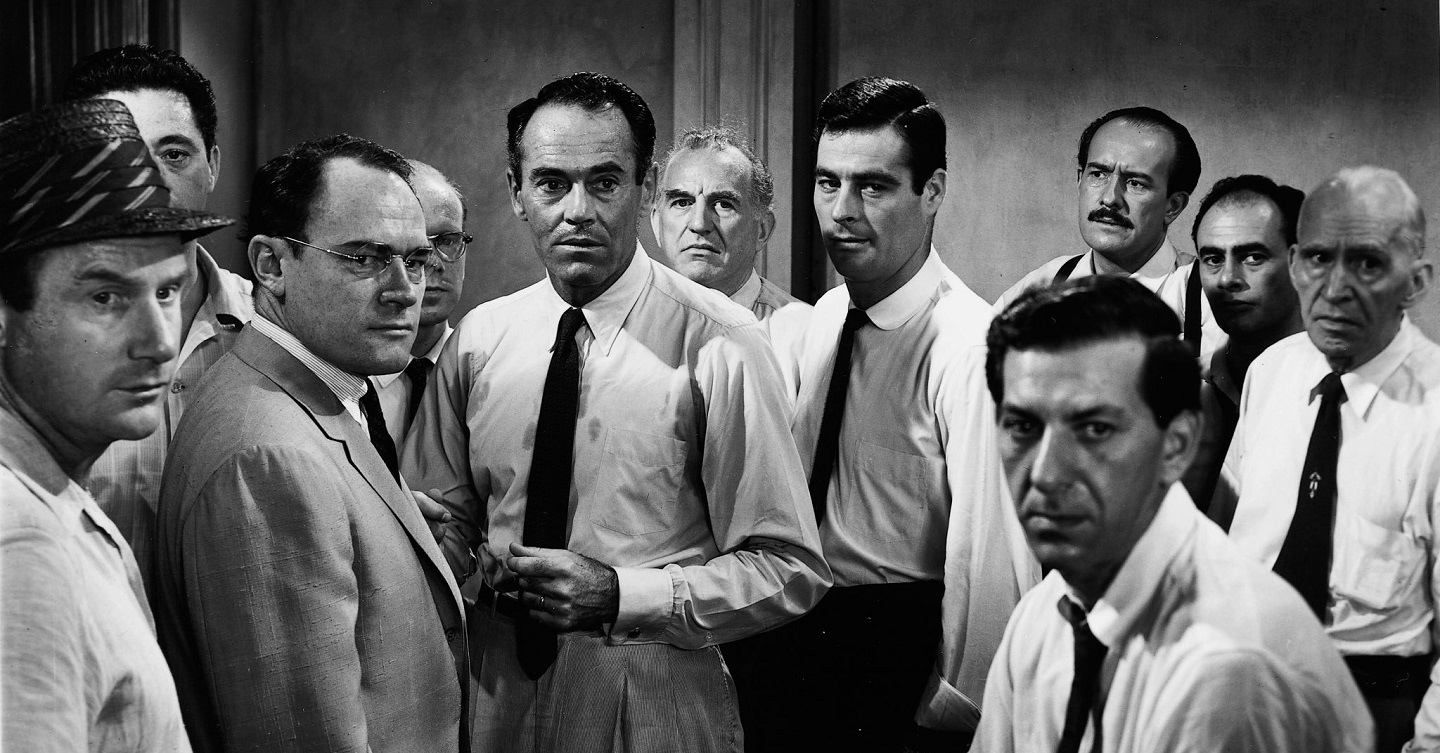
If any Council members object to a resolution, it will not pass.
In 12 Angry Men, the classic movie starring Henry Fonda, a dozen jurors must reach a unanimous conclusion about whether an accused teenager is guilty—or not—of murder. The stakes are high: if guilty, he may be given the death penalty. Yet eleven of the twelve jurors quickly vote to condemn the young defendant, and only one has a reasonable doubt. As the story unfolds, the doubtful juror convinces the others, one by one, to change their minds until they finally reach a unanimous decision to acquit the accused murderer.
The European Council is similar to 12 Angry Men in its requirement for consensus for most Common Security and Foreign Policy (CSFP) decisions. If any Council members object to a resolution, it will not pass. However, unlike the jurors in 12 Angry Men, Council members are not locked in a chamber and forced to agree. As a result, the bias leans strongly toward inaction, leading to frustrated calls to change from a unanimity-based process to one in which the majority decides. Adopting Qualified Majority Voting (QMV) would result in a more active, effective, and ultimately more relevant European Council. This would, in turn, greatly enhance the EU’s credibility as a deterrent to malign state actors and a strategic partner for the United States.
The Current Decision-Making Processes
Although the European Council makes many decisions by majority vote, Article 31(1) of the Treaty on European Union (TEU) stipulates that on matters of CSFP, the Council shall make decisions unanimously. Two implications stem from this requirement for unanimity. On one hand, unanimous endorsement gives a decision the power to propel the action forward. However, the process of creating unanimous agreement between over two dozen members is arduous enough that decisions emerge slowly, if at all.
The TEU nevertheless still leaves room for some disagreement. If a member of the Council objects to a proposed decision, the member may simply abstain from voting, with the understanding that the decision will not be binding upon the member’s country. Solidarity is maintained between the dissenting member and the rest of the Union, as the dissenting Member State respects the Union’s decision (and does not take any action that would counter it), and the remaining Member States respect the dissenting Member State’s position. If more than a third of the Member States abstain in this manner, the TEU recognizes that the spirit of unanimity is unable to be achieved, and the proposed decision does not move forward. Furthermore, if only one Member State objects to a proposal but does so on grounds of vital national policy, the Council will not vote on the proposal and will therefore not adopt it. This is referred to as the “emergency brake” provision.
The Bosnia Experience
The eruption of violence in the former Yugoslavia in the early 1990s revealed the challenges of unanimous decision-making for the EU. Marred by war crimes, ethnic cleansing, and widespread physical destruction, Bosnia and Herzegovina was roiled in conflict from April 1992 until November 1995. Despite widespread recognition of the troubles in the Balkans being a European issue demanding European-led solutions, there was no unified and clear political approach to the problem.
European countries were reluctant to commit the ground troops necessary to stop the fighting in Bosnia and Herzegovina, either unilaterally or as part of a United Nations effort. Although the United Nations was engaged in peace operations, its focus was on humanitarian assistance, and the level of commitment was insufficient. EU deliberations pitted intransigent French proposals against German ones, and featured Britain and Greece each acting as obstructionists at times.
Despite the EU’s proclamation of commitment to a Common Foreign and Security Policy at the Maastricht summit in December 1991, deadly conflict consumed Bosnia four months later. Clearly, a vague proclamation of commitment to security from each Member State was within reach, while unanimity on an actual course of action was not. With the crisis worsening and the EU unable to reverse the spiral of destruction which included, among other atrocities, the massacre of 8,000 Bosnian Muslims at Srebrenica, the United States ultimately led a NATO military response. The impotence of the EU to solve a crisis in its own backyard, the worst devastation in Europe since World War II, was a humiliating black eye to advocates of European leadership and led to renewed interest in empowering EU common defense policy.
While questions of national interests and/or differing views of problems are still the main reasons, some Member States are increasingly blocking collective action due to pressure from outside powers, most notably Russia and China.
The QMV Proposal and its Impact
As the Bosnia case clearly demonstrates, the EU Council’s requirement for unanimity on matters related to CSFP hampered the EU’s ability to respond to the crisis promptly and coherently. Unfortunately, there has been little meaningful change to the EU’s decision-making processes since the 1990s; some individual EU Member States largely still can—and do—derail collective action. While questions of national interests and/or differing views of problems are still the main reasons, some Member States are increasingly blocking collective action due to pressure from outside powers, most notably Russia and China. When the EU in 2016 sought to issue a strong statement on the South China Sea territorial disputes between China and the Philippines, growing Chinese investment in Hungary and Greece induced these countries to water down the statement. Regrettable actions such as these do not bode well when both EU public opinion and allies, including the United States, desire a stronger and more coherent EU foreign policy.
The introduction of QMV to CSFP would improve the EU’s ability to decide matters in a timely manner and prevent individual Member States from blocking collective action. Under QMV, a qualified majority is reached when at least 55% of Member States (15 of 27) vote in favor, and the proposal is supported by at least 65% of the EU population. Extending QMV would not require modification to any treaties thanks to Article 31(3) of the TEU and the so-called “passerelle clauses.” According to this article, the “European Council may unanimously adopt a decision stipulating that the Council shall act by a qualified majority.” With the EU’s decades of experience successfully deciding important economic, trade, internal, and other matters by means of QMV, the extension of QMV to foreign and security policy would not be unnatural or unprecedented for the EU.
While QMV would not solve larger divisions that exist within the EU (for example, new/old, west/east, and north/south), it would limit the ability of a single Member State to alter, delay, or thwart collective action. Also, as membership in the EU grows and threats to the EU proliferate, unanimity risks further paralyzing the EU’s decision-making processes and its ability to defend its citizens and interests effectively. In an era of global power competition, QMV is not a panacea but a small step that will help the union incrementally improve its ability to become a global economic—and political—actor.
Conclusion
In this era of global power competition, a timelier decision-making process related to EU security matters is critical in order to effectively counter emerging threats and ensure survival of the EU. Events to include the outbreak of violence in the Western Balkans revealed the EU’s inability to effectively deal with foreign policy challenges in real-time because of the need for Member State unanimity. As democracies are increasingly engaged with Russia and China along the entire spectrum of competition, Europe’s CSFP concerns demand a nimble and decisive European Council—even more so if a proposed European Army is to ever be a credible deterrent. To improve the EU’s ability to affect future action in a timely manner, implementation of QMV would substantially improve the ability of a majority of Member States to reach decisions more efficiently. Beyond improving EU decision-making, this long-debated incremental change would also greatly enhance the EU’s standing in the eyes of the United States and other international partners such as NATO, because the EU would increasingly be seen not just as a capable economic partner, but a reliable political partner as well. The alternative—continuing to allow the obstinacy of 27 angry men to halt collective action—risks eventually relegating the EU to irrelevance in security matters.
David Haugen is a graduate of the AY21 Resident Class of the U.S. Army War College. He previously served as Political Chief at U.S. Consulate General Erbil where he led efforts with Kurdish and Interagency partners to prevent the reconstitution of ISIS, counter Iranian malign influence, and protect religious and ethnic minority communities in Iraq’s Ninewa Plain.
Audrey Laden is a graduate of the AY21 Resident Class of the U.S. Army War College. She began her career as an Accountant with the Defense Finance and Accounting Service. Throughout her career she has been assigned to multiple Army Commands and Defense Agencies.
Craig McFarland is a colonel in the U.S Army and a graduate of the AY21 Resident Class of the U.S. Army War College. He received his commission as a Medical Service Corps Officer from the United States Military Academy in 1994, and was recommissioned as a Captain in the Medical Corps upon receiving his medical degree from the University of Miami.
The views expressed in this article are those of the authors and do not necessarily reflect those of the U.S. Army War College, the U.S. Army, or the Department of Defense.
Photo Description: Screen capture from the film 12 Angry Men
Photo Credit: This work is in the public domain in the United States because it was published in the United States between 1926 and 1977, inclusive, without a copyright notice.





Congratulations Audrey! Well done!
As a retired US Army Lieutenant Colonel, with 16 years senior level experience in the UN and two years as a Deputy COS with an EU Mission in Kosovo, I agree with the tenants of the article. However, how do the authors propose that a QMV be agreed to within the EU, especially when it is likely that close to 1/3 of the member states would oppose such?